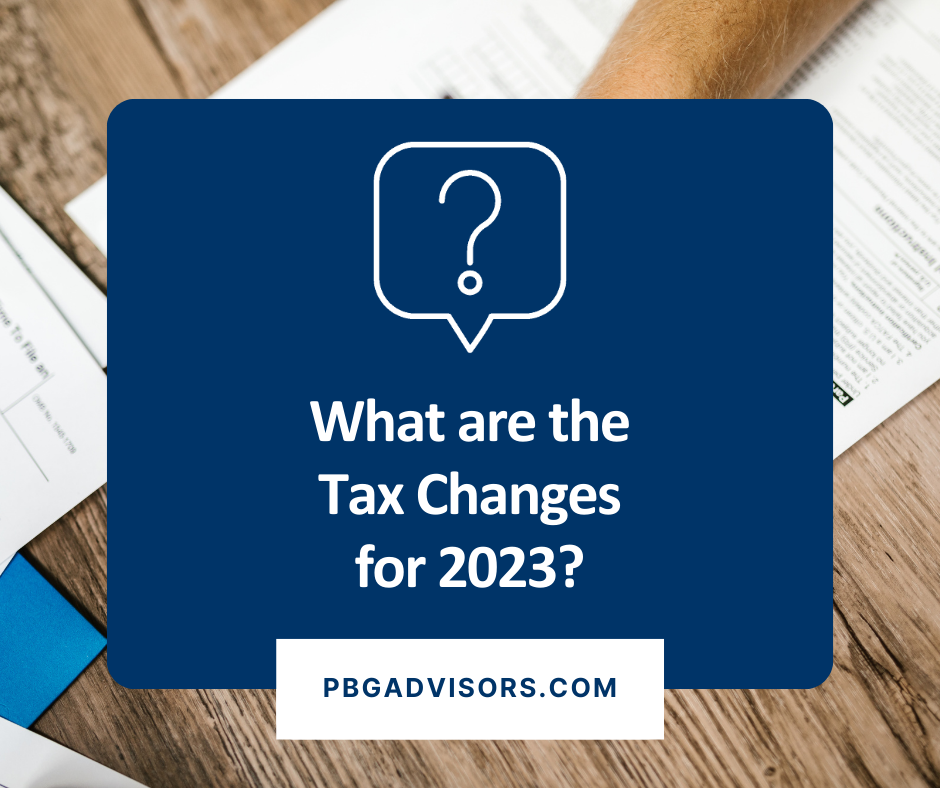Tax seasons often come with their fair share of alterations and updates, and the year 2023 has introduced a range of changes that taxpayers should be mindful of when filing their returns. These shifts encompass various aspects, from deductions and credits to alterations in tax brackets and regulations. Let’s delve into the significant tax changes for 2023 that taxpayers should keep in mind.
Tax Bracket Adjustments
One of the most critical aspects for individuals and families is the adjustments in tax brackets. These alterations can significantly impact the amount of taxes owed or the refund due. Tax brackets often undergo modifications due to inflation and changes in the tax code. In 2023 we have seen inflation affect nearly everything. Because of record high inflation, the IRS has raised income thresholds about 7%. NerdWallet has created this awesome tax bracket if you want to see where you household falls. Taxpayers should stay updated on these shifts to accurately gauge their tax liabilities.
Standard Deduction Modifications

The standard deduction is another area subject to annual revisions. It’s a vital component that can influence whether a taxpayer chooses to itemize deductions or opt for the standard deduction. For the 2023 tax year the standard deduction has gone up. For married couples filing jointly for tax year 2023 the standard deduction is $27,700, which is $1,800 more than last year. For those with a Single filing status, the standard deduction is $13,850, up $900 from last year. Click here for further information about the 2023 standard deduction. Changes in the standard deduction amount can affect the decision-making process for individuals and families regarding which method to utilize when filing their taxes.
Itemized Deduction Qualifications
Taking the higher standard deduction is more practical for most filers. However, if you have enough tax-deductible expenses, you might benefit from itemizing. The rules for itemizing have not changed much for 2023. Look at the rules below to see if itemizing would benefit you.
- State and local taxes: The deduction for state and local income taxes, property taxes, and real estate taxes is capped at $10,000.
- Mortgage interest deduction: The mortgage interest deduction is limited to the first $750,000 of mortgage debt. Anyone who had $1,000,000 of home mortgage debt before December 16, 2017, will still be able to fully deduct the interest on that loan.
- Medical expenses: Only medical expenses that exceed 7.5% of adjusted gross income (AGI) can be deducted in 2023. Therefore, if your AGI is $150,000, your medical expenses must be more than $11,250. This does not include health insurance premiums paid by your employer, cosmetic surgery, nonprescription medicines, etc. Deductible medical expenses may include amounts paid to doctors, for prescription medicines, inpatient care, transportation specifically for medical care, and many more.
- Charitable donations: In 2023, the annual income tax deduction limits for gifts to public charities are 30% of AGI for contributions of non-cash assets—if held for more than one year—and 60% of AGI for contributions of cash. Check out our Facebook post from December 19, 2023 for more information about charitable donations.
- Miscellaneous deductions: No miscellaneous itemized deductions are allowed this year.
Tax Credits
Tax credits provide direct reductions that can reduce your overall tax liability. Please talk to your tax preparer about credits that you might be eligible for. Keep in mind that for 2023, the child tax credit is $2,000 for each child 17 years of age or younger and $500 for other qualified dependents.
Estate & Gift Tax
1. The estate tax exemption has increased to $12,920,000.
2. The annual exclusion for gifts is $17,000 for calendar year 2023.
Retirement Account Contribution Limits
For those investing in retirement accounts like 401(k)s or IRAs, contribution limits can influence long-term savings strategies. These limits tend to increase periodically to adjust for inflation or other economic factors. Per the IRS the amount individuals can contribute to their 401(k) plans in 2023 is $22,500.
Health Savings Account (HSA) Adjustments
HSAs offer tax advantages for individuals managing healthcare expenses. Keep in mind that you must have a qualifying HSA to claim this deduction (Do I have a qualifying HSA?). In 2023, the maximum that an individual can contribute to an HSA is $3,850 for an individual and $7,750 for a family.
Filing Deadlines and Procedures
Staying informed about filing deadlines and procedures is always crucial. The filing deadline for individuals (including Schedule C filers) and C-Corporations in the upcoming year is April 15, 2024, for both Federal and Colorado returns. Business owners should take note that businesses taxed as partnerships or S Corporations must file by March 15, 2024. If more time is needed to file, please talk to your tax preparer about filing an extension. Our office will also set deadlines for our clients to have all tax documentation in to ensure that there is ample time to prepare your return.
As with any tax year, staying informed and seeking professional guidance when needed is key to navigating these changes effectively. Taxpayers should remain proactive, keeping informed of updates in tax changes for 2023, and seeking guidance from tax professionals to optimize their tax filings in 2023.
Written by: Karli Jean Pena

